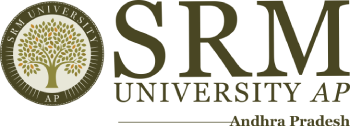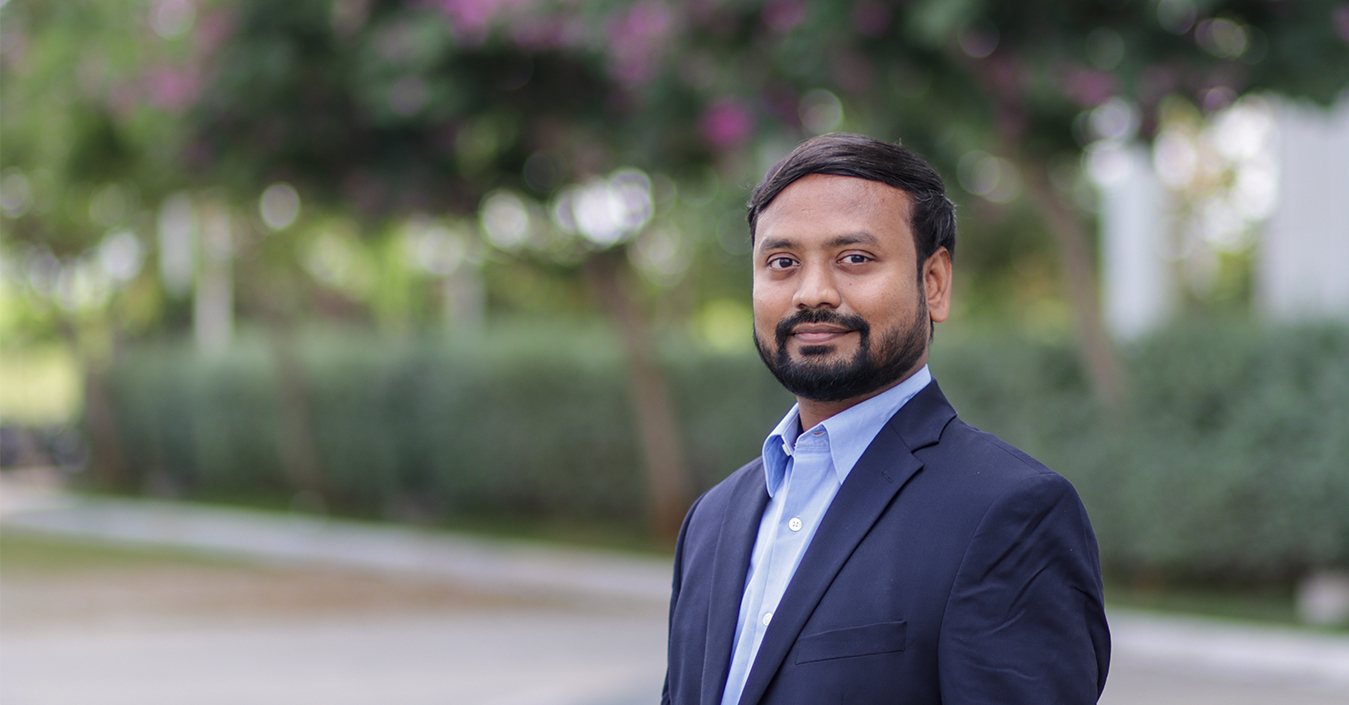
Message From HOD
SRM University - AP
About Our Vision & Our Mission
At SRM University AP, our vision and mission are at the heart of everything we do. We envision a world where education empowers individuals to become leaders, innovators, and changemakers. Our mission is to provide students with not just academic knowledge, but the skills, creativity, and ethical grounding needed to thrive in the modern world.
Our Vision
To emerge as a world-class research and teaching department which equips students with creative thinking and social skills to positively impact the scientific community, industry, and society by generating new knowledge and fostering innovations.
Our Mission
Deliver high-quality education at various levels to promote a deep understanding of chemical principles. Contribute to scientific knowledge and industry through cutting-edge chemistry research. Create an atmosphere that encourages innovation and entrepreneurship, leading to the development of modern technologies and applications.
Programmes Offered
At School of Engineering and Sciences , our departments work collaboratively to provide the highest quality services to our clients. From our innovative Research & Development team, which is constantly pushing boundaries to create groundbreaking solutions, to our dedicated Customer Support department, ensuring seamless experiences, every department plays a pivotal role in driving our success.
B.Sc. Chemistry (Hons.)
B.Sc. in Chemistry is a four-year undergraduate programme offering a solid foundation in organic, inorganic, and physical chemistry. It provides practical lab experience and prepares students for advanced studies or careers in related fields.
MSc in Chemistry
The two-year MSc Chemistry programme at SRM University-AP offers research-based learning with a blend of theory and practical experience. Students engage in hands-on research through year-long projects, gaining exposure to advanced instruments and high-quality research.
Ph.D. (Doctor of Philosophy)
A PhD in Chemistry is a full-time advanced programme offering in-depth training and research in emerging fields. It aims to develop skilled professionals contributing to chemistry through original research and innovation.
WHY CHEMISTRY AT SRM UNIVERSITY-AP !
Curriculum
Research-oriented curriculum aligning with NEP 2020 to anchor the research aptitude of students
New-age Pedagogy
20% of lectures conducted through Active learning pedagogy/Project-based learning
Industry Exposure
Every student will get a chance to go to Industry for research internships for up to one semester
Cutting-edge problems
Opportunity to work closely with faculty members and doctoral students on cutting-edge problems
Research-oriented learning
Every student will get a chance to publish at least one research paper Scopus indexed journals
Mentoring for higher education
100% of the interested students will be mentored to pursue PG programs in reputed institutions in India and abroad
Latest News
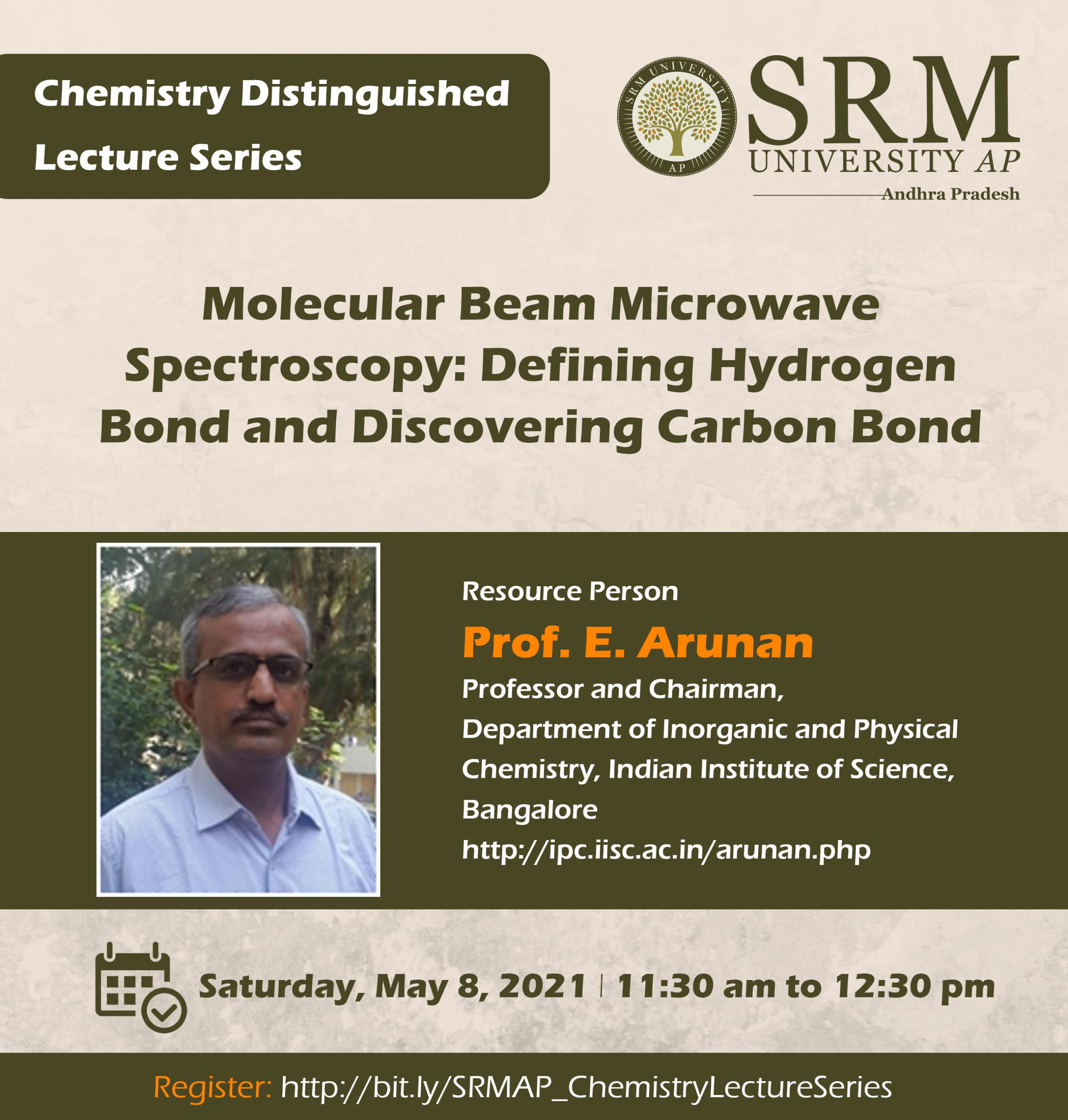
Prof Arunan to usher into the advancement of Molecular Beam...
 The Chemistry Distinguished Lectures series starts its voyage towards transcendental knowledge with an exciting discussion on “Molecular Beam Microwave Spectroscopy: Defining Hydrogen Bond and Discovering Carbon Bond” on May 8, 2021, at 11.30 am. Renowned scientist and Professor E Arunan from the Department of Inorganic and Physical Chemistry, Indian Institute of Science (IISc), Bangalore, will join the webinar as the Keynote Speaker.
The Chemistry Distinguished Lectures series starts its voyage towards transcendental knowledge with an exciting discussion on “Molecular Beam Microwave Spectroscopy: Defining Hydrogen Bond and Discovering Carbon Bond” on May 8, 2021, at 11.30 am. Renowned scientist and Professor E Arunan from the Department of Inorganic and Physical Chemistry, Indian Institute of Science (IISc), Bangalore, will join the webinar as the Keynote Speaker.
Professor Arunan has extensive research experience in the field of Chemical Sciences and is long associated with IISc, Bangalore, one of the premier institutes of India. Dr Arunan pursued his undergraduate studies at The American College, Madurai, followed by two masters from IIT Madras and IIT Delhi. He obtained his doctoral degree from Kansas State University, USA. Prior to becoming an academician, he worked as a Post-Doctoral Scholar at the University of Illinois at Urbana-Champaign. Prof Arunan started his career as an Assistant Professor at the Department of Chemistry, IIT-Kanpur in 1995. He later moved to the Department of Inorganic and Physical Chemistry, IISc, Bangalore and became a Professor in 2009 and Chairman in 2018.
Prof Arunan’s research interests include experimental physical chemistry, molecular and van der Waals spectroscopy, chemical kinetics and dynamics, hydrogen bonding and other intermolecular bonds/interactions, shock wave interactions with molecules and materials, astrophysics/astrochemistry. He has published around 100 papers in peer-reviewed international Journals, 14 in International Conference Proceedings, 8 in Resonance, the Journal of Education and 16 in Current Science, published by the Indian Academy of Sciences. The celebrated personality has given numerous plenary, keynote and invited lectures all over India and many countries in the world, including the USA, UK, France, Germany, Italy, Poland, Spain, Portugal, Hungary, Finland, Russia, Australia, Czech Republic, China, Pakistan, Bangladesh, Singapore and South Korea. He has delivered inspiring talks at most of the premier institutes in India and also in colleges and high schools all over India.
Prof Arunan is a Fellow of International Union of Pure and Applied Chemistry, Indian Academy of Sciences and a member of the International Advisory Board for ‘Horizons in Hydrogen Bond Research” Conference 2011, International Advisory Board for the Asian Spectroscopy Conference 2009-2013, Programme Advisory Committee on Physical Chemistry, Department of Science and Technology 2008-2012, International Advisory Editorial Board for Physical Chemistry Chemical Physics, Royal Society Publication, From 2005 and many other organisations and advisory boards. Further, he is serving the scientific community as the Section Editor (Chemistry) for Current Science from 2018, Associate Editor from 2013, Associate Editor for Journal of Chemical Sciences from 2012-2016.
Prof Arunan’s contributions to the world of Chemical Sciences has been acknowledged with many awards and accolades. He was the recipient of the Chemical Research Society of India Bronze Medal 2008. He is also the Founder Member cum Vice-President of the Indian Society for Shockwave Research.
Chemistry enthusiasts are encouraged to join the webinar to learn more on the Molecular Beam Microwave Spectroscopy from the expert himself on May 8, 2021, at 11.30 am.
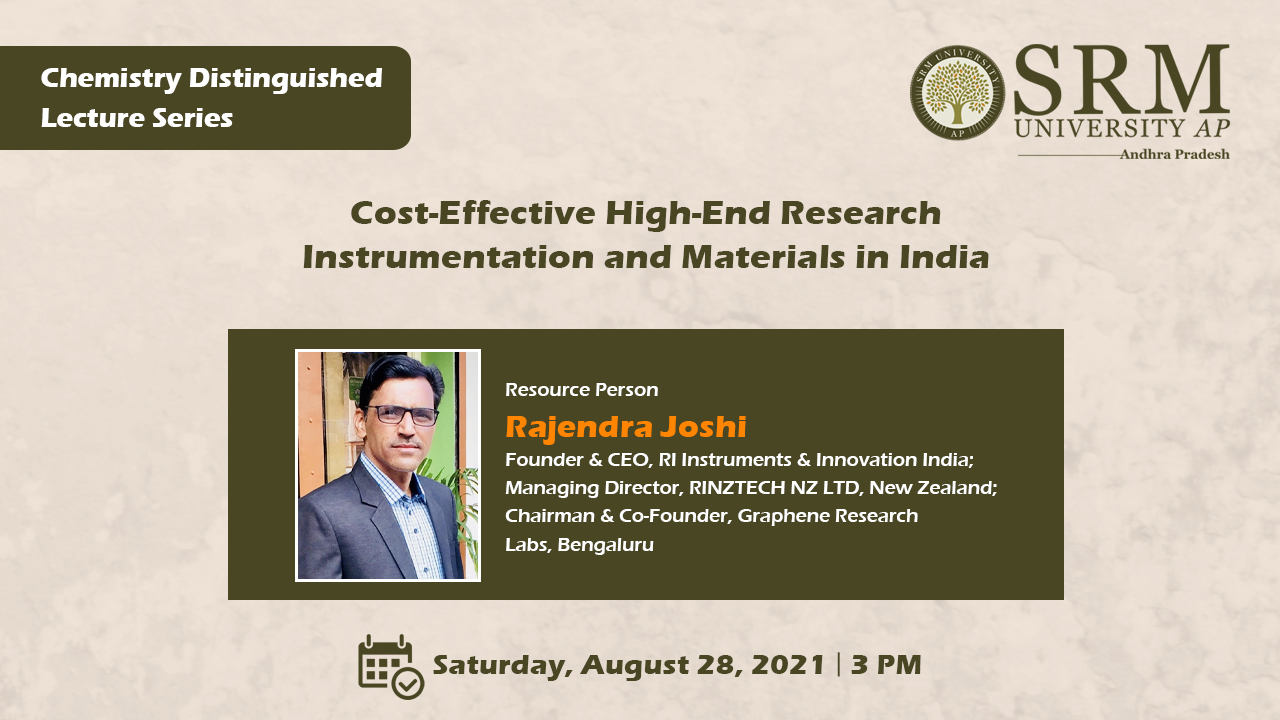
Cost-effective high-end research instrumentation and materials in India
 The Department of Chemistry is organising the second episode of the Department Lecture Series on August 28, 2021, at 03.00 pm. Dr Rajendra Joshi, Chairman of RI Group, will deliver a lecture on the topic “Cost-effective high-end research instrumentation and materials in India”.
The Department of Chemistry is organising the second episode of the Department Lecture Series on August 28, 2021, at 03.00 pm. Dr Rajendra Joshi, Chairman of RI Group, will deliver a lecture on the topic “Cost-effective high-end research instrumentation and materials in India”.
Indigenous development of upper end scientific analytical instruments in India has always been a big challenge. RI Instruments & Innovation India has proved that with cohesive teamwork, this is very much possible. The group has designed Raman Spectrometer, RIUS (Universal Spectroscopy), RIMS (Modular spectroscopic work station) XRD, TEM (Under Trial), Class AAA Solar simulator, the world’s smallest USB microscope and a few more.
About the speaker:
Dr Rajendra Joshi is the recipient of the National Innovation Award for the year 2019 by the Ministry of Chemicals and Fertilizer, Govt. of India for the innovation of Graphene Oxide / Li based rechargeable batteries with replaceable electrodes. As an Instrumentation Professional and Material’s Physicist, he started his career at National Physical Laboratory, New Delhi in the year 1997 – 1998. He has certification in Quality Control/R&D Professional training from Japan, Germany, France, Italy and UK. Cost-effective solar simulator, Indian designed drone for societal applications, Graphene Oxide-based rechargeable battery with replaceable electrodes etc are some of his major achievements.
To know more about the cost-effective high-end research instrumentation and materials in India, join this webinar on August 28, 2021, at 03.00 pm.
Register here:https://srmap.zoom.us/webinar/register/WN_TFkeKpn2TWSwfm2qdpYpGw
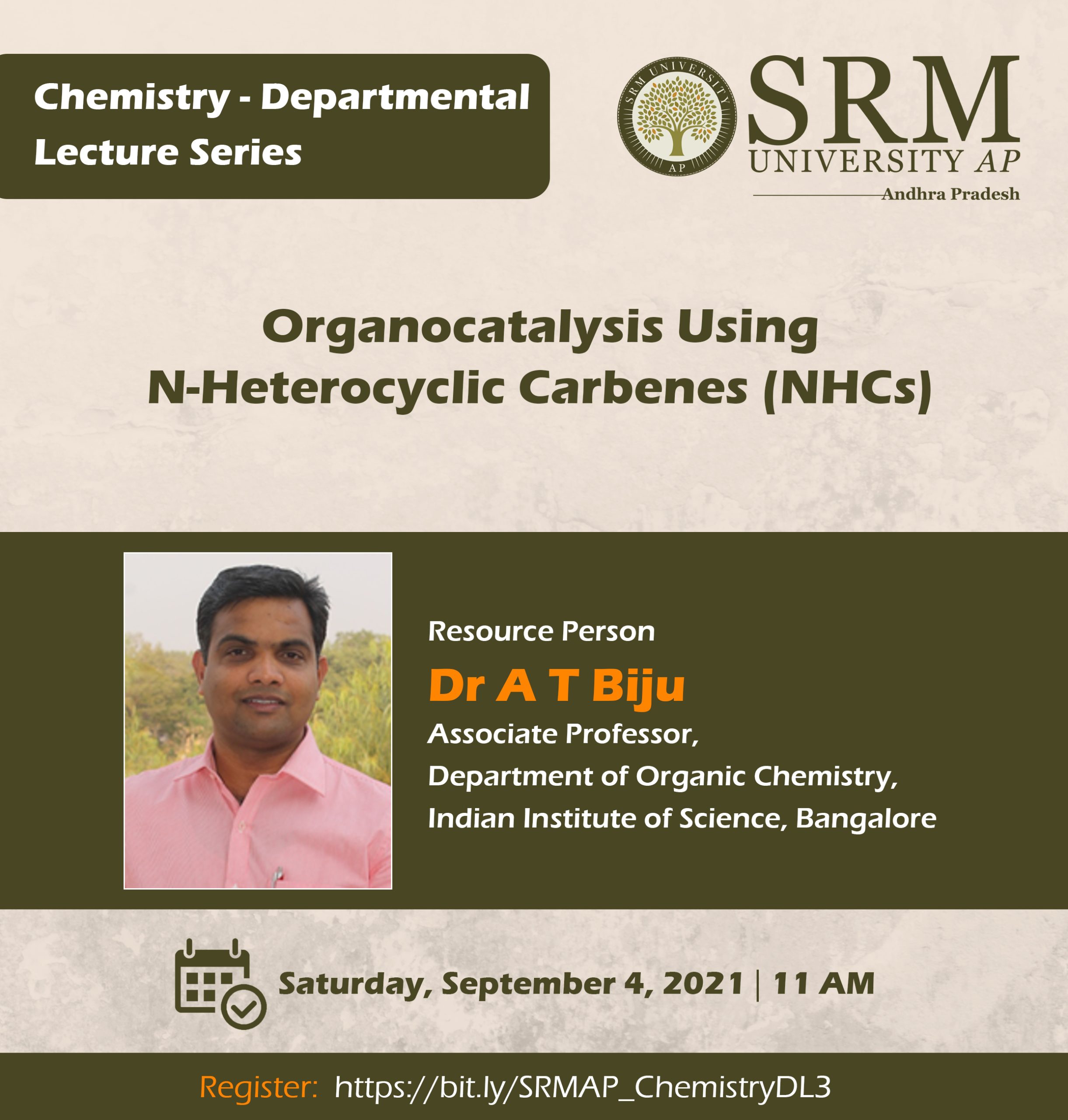
Dr A T Biju unveils the mystery of Organocatalysis
 Chemistry Departmental Lecture Series brings another captivating webinar on “Organocatalysis Using N-Heterocyclic Carbenes (NHCs)”. Dr A T Biju, Associate Professor, Department of Organic Chemistry, Indian Institute of Science, Bengaluru, will deliver the keynote address on Saturday, September 04, 2021, at 11 am.
Chemistry Departmental Lecture Series brings another captivating webinar on “Organocatalysis Using N-Heterocyclic Carbenes (NHCs)”. Dr A T Biju, Associate Professor, Department of Organic Chemistry, Indian Institute of Science, Bengaluru, will deliver the keynote address on Saturday, September 04, 2021, at 11 am.
Abstract
Catalysis is a fundamentally sustainable process, which can be used to produce a wide range of chemicals and their intermediates. Among the various catalytic methods, N-heterocyclic carbene (NHC)-catalyzed umpolung of aldehydes is widely used for unconventional access to target molecules. Moreover, NHC-catalysis is known for umpolung of Michael acceptors, but imine umpolung was unknown in this realm of catalysis. In this context, Dr Biju and his team have demonstrated, for the first time, the NHC-catalyzed umpolung of imines for the synthesis of 2,3-disubstituted indoles, functionalized quinolines and dihydroquinoxalines. In addition, NHC-catalysis is widely used for the generation of α,β-unsaturated acylazoliums, followed by their interception with various nucleophiles, the formal [3+3] annulation reactions. In this area, recently Dr Biju and his team have reported the enantioselective NHC-catalyzed annulation reactions for the synthesis of dihydropyranones, dihydropyridinones, cyclopentenes, pyrazoles, spirocyclohexadienones, tricyclic δ-lactones, tetracyclic indoles etc., where NHC-bound α,β-unsaturated acylazoliums are the key intermediates. Very recently, Dr Biju employed the umpolung of aldehydes for the synthesis of axially chiral C-N bond-containing molecules. The keynote address will shed further light on this.
About the speaker
Dr A T Biju received his M Sc from Sacred Heart College Thevara (affiliated to MG University, Kerala, India) and PhD from CSIR-NIIST (Formerly RRL), Trivandrum, India. After that, he worked as a post-doctoral fellow with Prof. Tien-Yau Luh at the National Taiwan University, Taipei. He has also worked as an Alexander von Humboldt fellow with Prof. Frank Glorius at the Westfälische Wilhelms-Universität Münster, Germany. In June 2011, he began his independent research career at the CSIR-National Chemical Laboratory, Pune. He became an Associate Professor at the Department of Organic Chemistry, Indian Institute of Science, Bengaluru, in June 2017. His research focuses on the development of transition-metal-free carbon-carbon and carbon-heteroatom bond-forming reactions using aryne chemistry and N-heterocyclic carbene (NHC) organocatalysis and their application in organic synthesis.
Chemistry enthusiasts are welcomed to avail the opportunity to listen to him on Saturday, September 04, 2021, at 11 am
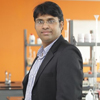
Dr Nimai Mishra delivered an invited talk at the prestigious...
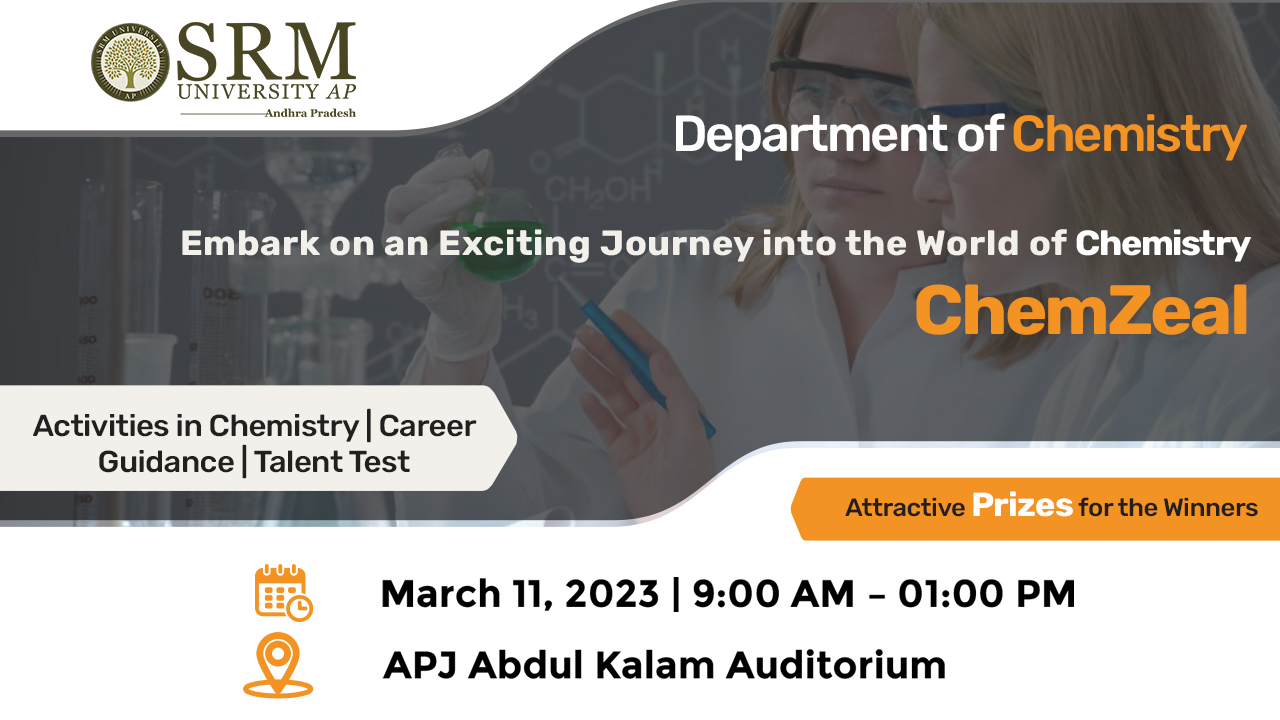
Expand your Horizons with Chemzeal!

The Department of Chemistry at SRM University-AP is organising a fun and interactive outreach programme, “ChemZeal” on March 11, 2023, that offers a platform for students to engage with chemistry excitingly while learning about the latest research and technological advancements. The programme is open to all undergraduate students with a science background and who have a genuine interest in the world of chemistry. The outreach project includes activities in chemistry, a career guidance session enlightening on the scopes and opportunities in various fields and a thrilling talent test. Impressive prizes will be awarded to winners of the contest.
Objectives of ChemZeal:-
- Providing Hands-on experience with world-class research equipment
- Expanding knowledge: Learn about the latest developments in the field of chemistry.
- Enhancing career prospects: Career guidance on various career paths in the field of chemistry.
- Networking with peers: A platform to connect with other students who share a passion for chemistry.
Join the programme and experience the wonders of chemistry with ChemZeal – A Day for Chemistry!

Trends in Life Sciences Industry

The Life sciences industry comprises companies working in research, development and manufacturing of pharmaceuticals, biotechnology-based food and medicines, medical devices, biomedical technologies, nutraceuticals, cosmeceuticals, food processing, and other products that improve the lives of organisms. The Department of Chemistry is conducting an invited lecture as part of its Industry Expert Lecture Series on April 24, 2023. The talk on “Trends in Life Sciences Industry” will be delivered by Dr Gokulakrishnan Srinivasan, Business Head – Spectroscopy (Molecular, BEA, MC, SA), Chemical Analysis Division at Thermo Fisher Scientific.
Join the lecture for an insightful session!
About the Speaker
Dr Gokulakrishnan Srinivasan is a highly qualified professional with over 12 years of experience together in sales, people management, P&L, business development, and scientific applications, for highly regarded global suppliers of Scientific/Analytical equipment, across South Asia. He is currently working at Thermo Fisher Scientific as the Business Head – Spectroscopy (Molecular, BEA, MC, SA), FSI in the Chemical Analysis Division. Prior to his position as Business Head, he held a brief tenure as Business Manager – Molecular Spectroscopy, Surface Analysis and then later as General Manager – Molecular Spectroscopy, Surface Analysis at Thermo Fisher Scientific.
He was awarded a Doctorate in Chemistry from the Institute for Physical Chemistry, University of Stuttgart, Germany and was a Post Doctoral Research Fellow at the Department of Bioengineering and Beckman Institute for Advanced Science and Technology, University of Illinois. Dr Srinivasan has also published in 13 peer-reviewed international journals and is editor of a book for McGraw Hill Publications, USA entitled “Vibrational Spectroscopic Imaging for Biomedical Applications”.
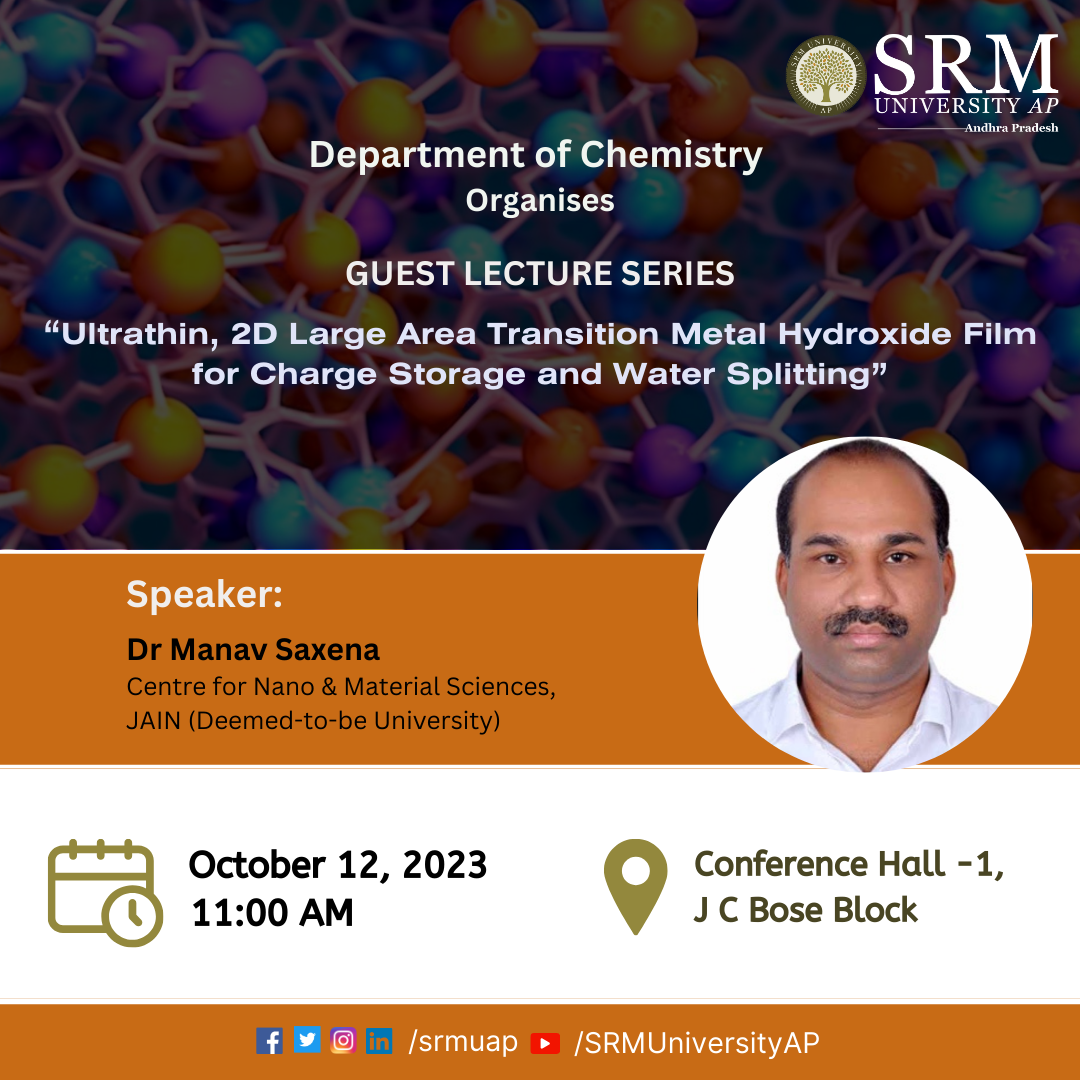
Towards Renewable and Sustainable Energy Storage Devices

With the stellar increase in energy demands and the consequent crisis of environmental degradation, there is a predominant need for sustainable renewable energy storage systems. To enlighten further on this matter, The Department of Chemistry is organising a Guest Lecture on “Ultrathin, 2D large area transition metal hydroxide film for charge storage and water splitting” by Dr Manav Saxena, Centre for Nano & Material Sciences, JAIN (Deemed-to-be University). The session is scheduled to be held on October 12, 2023, and will explicate the development of ultrathin charge storage devices as an alternate source of storage and conversion systems.
Join the session to learn more about the recent advancements in renewable energy storage systems!
Abstract
The ever-increasing energy demands and growing environmental pollution have triggered enormous attention toward developing sustainable renewable energy storage and conversion systems. Large-area, ultrathin two-dimensional (<20 nm) nanostructures of electrode material could be effective for electrochemical and electrocatalytic purposes due to their abundant active sites, high specific surface area, and ultrathin thickness, which facilitates shortening the ion diffusion length.
However, small lateral size, non-uniformity and defect formation during the synthesis hinder the device’s performance. To date, very few endeavours have been made to synthesize large-area nanosheets. However, the lateral size of this nanosheet is less than 1 mm and smaller than other 2D materials, which generates fabrication challenges and consequently affects the performance of real devices. Herein, we developed the ultrathin, large-area, freestanding, and non-layered transition metal hydroxide (Co, Ni, Mo) nanosheet and its Van der Waals heterostructures grown at a water-air interface via an oven-based wet chemical synthesis method at low temperature. This work offers a competitive route towards a rational design and the development of ultrathin charge storage devices and high-performance OER electrocatalysts.
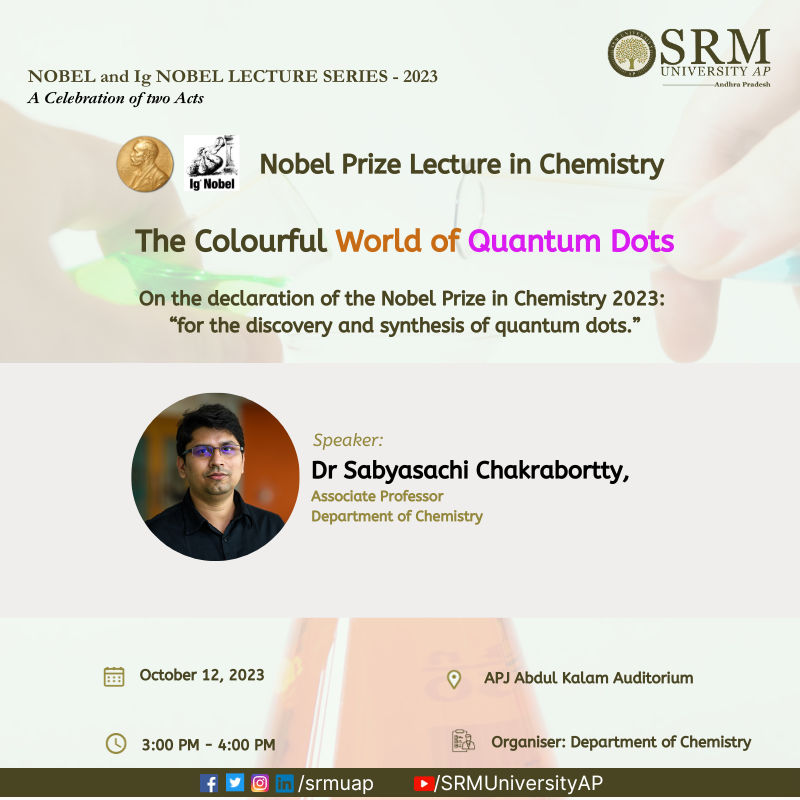
Nobel Lecture in Chemistry – Delve into the World of...

On the declaration of the Noble Prize in Chemistry 2023: “for the discovery and synthesis of quantum dots, the Department of Chemistry feels is organising Noble and Ig Noble Lecture Series. The Department is hosting the first captivating intellectual odyssey by Dr Sabyasachi Chakrabortty, Associate Professor, Department of Chemistry on October 12, 2023. Dr Chakrabortty will deliver the lecture on “The Colourful World of Quantum Dots.” This session promises to be a thought-provoking exploration of the fascinating realm where quantum physics and nanotechnology converge opening up new horizons in science and technology.
Prepare to be enthralled as we delve into the microscopic world of quantum dots, where the properties of matter behave in ways that challenge our understanding of the physical universe. Let us journey through the vibrant and diverse landscape of these nanoscale wonders.
Join now for an illuminating session!
Abstract
Quantum dots (QDs), nanoscale semiconductor particles, have emerged as a fascinating field of research and application due to their unique synthesis methods, remarkable properties, and diverse range of applications. These tiny nanoparticles, typically in the range of 2 to 10 nanometers, exhibit size-tunable emission spectra, a property arising from quantum confinement effects, making them invaluable in many fields such as display technology, medical imaging, catalysis, renewable energies and so on. In this talk, the journey so far for QDs and the limitless possibilities they offer for the future will be discussed. The future is bright – it can range from flexible electronics, tiny sensors, thinner solar cells to encrypted quantum communication.
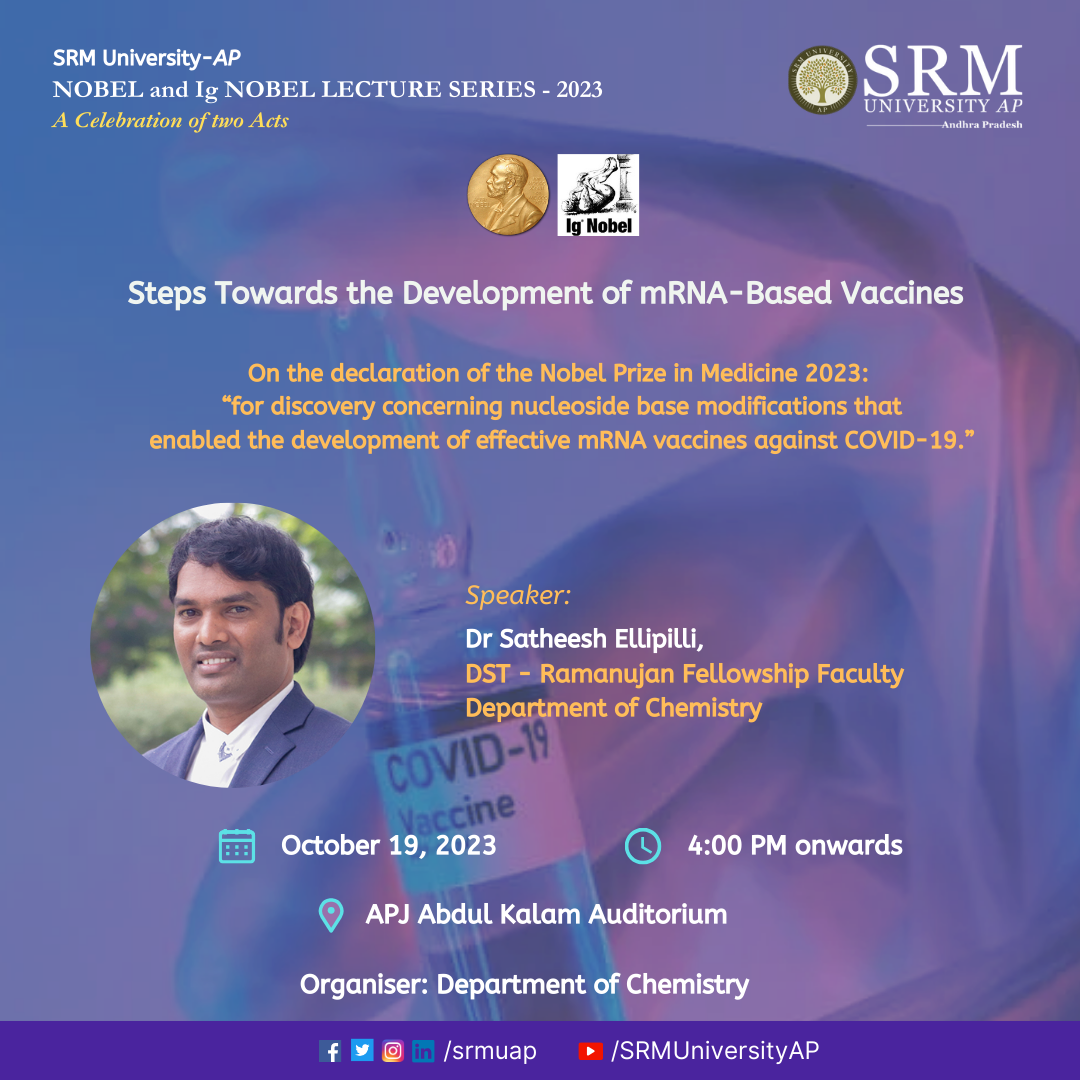
Unlocking the Future: Advancements Towards mRNA-Based Vaccines

In a constantly evolving world, we believe in celebrating those groundbreaking moments in science that shape our future. The Department of Chemistry organises the 2nd lecture of the Nobel & Ig Nobel Lecture Series–2023 on the “Steps Towards the Development of mRNA-Based Vaccines“. The lecture will delve into the cutting-edge advancements in developing mRNA-based vaccines with a session by Dr Sateesh E, Department of Chemistry, on October 19, 2023. This remarkable scientific achievement holds the potential to transform healthcare and the session will explore it from all angles.
Stay tuned for thought-provoking discussions, exciting discoveries, and a glimpse into the minds of some of the most brilliant and unconventional thinkers in the field!
Abstract
The Nobel Prize in Medicine in 2023 was awarded for the breakthrough discovery of nucleoside modifications in mRNA to develop effective mRNA-based vaccines. Their investigation for mRNA vaccine in the place of the conventional vaccine was hampered by the fact that in vitro synthesised mRNAs caused inflammation, whereas the cell-synthesized mRNAs did not elicit any inflammatory response. However, the inflammatory reaction was reduced when modified nucleosides were included in the mRNAs. This unravelled mystery of the reduced inflammation by the modified mRNA has led to the Nobel Prize-winning discovery that paved the way to develop effective mRNA vaccines against COVID-19 that saved millions of lives. This talk will discuss the journey towards the development of mRNA vaccines and their potential for the development of future vaccines and therapeutics.
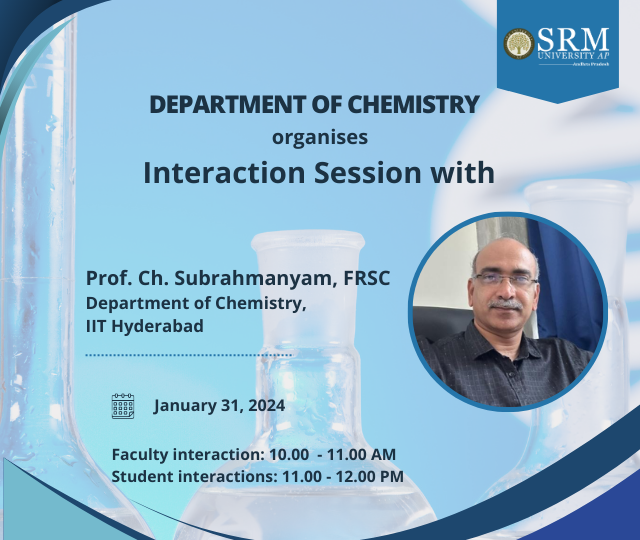
Prof. Ch. Subrahmanyam to Meet Faculty and Students

The Department of Chemistry is organising an Interactive Session for faculty and students with renowned academician Prof. Ch. Subrahmanyam from IIT Hyderabad on January 31, 2024. Prof. Subrahmanyam is an expert scholar and researcher in the fields of Energy, Environment and Nanomaterials and has been named in the top 2% scientists list by Stanford University. Recognised as a Fellow of the Royal Society of Chemistry (FRSC), he has also received numerous awards such as the Hiyoshi Environmental Award 2013, Research Excellence Award -IITH and many more.
Prof. Subrahmanyam has worked on pioneering research projects sponsored by UAY, MNRE, DST, CSIR, MOEF and DRDO and has 230 International journal publications to his credit.
Join the talk for a resourceful and insightful session!
Latest Events

Prof Arunan to usher into the advancement of Molecular Beam...
 The Chemistry Distinguished Lectures series starts its voyage towards transcendental knowledge with an exciting discussion on “Molecular Beam Microwave Spectroscopy: Defining Hydrogen Bond and Discovering Carbon Bond” on May 8, 2021, at 11.30 am. Renowned scientist and Professor E Arunan from the Department of Inorganic and Physical Chemistry, Indian Institute of Science (IISc), Bangalore, will join the webinar as the Keynote Speaker.
The Chemistry Distinguished Lectures series starts its voyage towards transcendental knowledge with an exciting discussion on “Molecular Beam Microwave Spectroscopy: Defining Hydrogen Bond and Discovering Carbon Bond” on May 8, 2021, at 11.30 am. Renowned scientist and Professor E Arunan from the Department of Inorganic and Physical Chemistry, Indian Institute of Science (IISc), Bangalore, will join the webinar as the Keynote Speaker.
Professor Arunan has extensive research experience in the field of Chemical Sciences and is long associated with IISc, Bangalore, one of the premier institutes of India. Dr Arunan pursued his undergraduate studies at The American College, Madurai, followed by two masters from IIT Madras and IIT Delhi. He obtained his doctoral degree from Kansas State University, USA. Prior to becoming an academician, he worked as a Post-Doctoral Scholar at the University of Illinois at Urbana-Champaign. Prof Arunan started his career as an Assistant Professor at the Department of Chemistry, IIT-Kanpur in 1995. He later moved to the Department of Inorganic and Physical Chemistry, IISc, Bangalore and became a Professor in 2009 and Chairman in 2018.
Prof Arunan’s research interests include experimental physical chemistry, molecular and van der Waals spectroscopy, chemical kinetics and dynamics, hydrogen bonding and other intermolecular bonds/interactions, shock wave interactions with molecules and materials, astrophysics/astrochemistry. He has published around 100 papers in peer-reviewed international Journals, 14 in International Conference Proceedings, 8 in Resonance, the Journal of Education and 16 in Current Science, published by the Indian Academy of Sciences. The celebrated personality has given numerous plenary, keynote and invited lectures all over India and many countries in the world, including the USA, UK, France, Germany, Italy, Poland, Spain, Portugal, Hungary, Finland, Russia, Australia, Czech Republic, China, Pakistan, Bangladesh, Singapore and South Korea. He has delivered inspiring talks at most of the premier institutes in India and also in colleges and high schools all over India.
Prof Arunan is a Fellow of International Union of Pure and Applied Chemistry, Indian Academy of Sciences and a member of the International Advisory Board for ‘Horizons in Hydrogen Bond Research” Conference 2011, International Advisory Board for the Asian Spectroscopy Conference 2009-2013, Programme Advisory Committee on Physical Chemistry, Department of Science and Technology 2008-2012, International Advisory Editorial Board for Physical Chemistry Chemical Physics, Royal Society Publication, From 2005 and many other organisations and advisory boards. Further, he is serving the scientific community as the Section Editor (Chemistry) for Current Science from 2018, Associate Editor from 2013, Associate Editor for Journal of Chemical Sciences from 2012-2016.
Prof Arunan’s contributions to the world of Chemical Sciences has been acknowledged with many awards and accolades. He was the recipient of the Chemical Research Society of India Bronze Medal 2008. He is also the Founder Member cum Vice-President of the Indian Society for Shockwave Research.
Chemistry enthusiasts are encouraged to join the webinar to learn more on the Molecular Beam Microwave Spectroscopy from the expert himself on May 8, 2021, at 11.30 am.

Cost-effective high-end research instrumentation and materials in India
 The Department of Chemistry is organising the second episode of the Department Lecture Series on August 28, 2021, at 03.00 pm. Dr Rajendra Joshi, Chairman of RI Group, will deliver a lecture on the topic “Cost-effective high-end research instrumentation and materials in India”.
The Department of Chemistry is organising the second episode of the Department Lecture Series on August 28, 2021, at 03.00 pm. Dr Rajendra Joshi, Chairman of RI Group, will deliver a lecture on the topic “Cost-effective high-end research instrumentation and materials in India”.
Indigenous development of upper end scientific analytical instruments in India has always been a big challenge. RI Instruments & Innovation India has proved that with cohesive teamwork, this is very much possible. The group has designed Raman Spectrometer, RIUS (Universal Spectroscopy), RIMS (Modular spectroscopic work station) XRD, TEM (Under Trial), Class AAA Solar simulator, the world’s smallest USB microscope and a few more.
About the speaker:
Dr Rajendra Joshi is the recipient of the National Innovation Award for the year 2019 by the Ministry of Chemicals and Fertilizer, Govt. of India for the innovation of Graphene Oxide / Li based rechargeable batteries with replaceable electrodes. As an Instrumentation Professional and Material’s Physicist, he started his career at National Physical Laboratory, New Delhi in the year 1997 – 1998. He has certification in Quality Control/R&D Professional training from Japan, Germany, France, Italy and UK. Cost-effective solar simulator, Indian designed drone for societal applications, Graphene Oxide-based rechargeable battery with replaceable electrodes etc are some of his major achievements.
To know more about the cost-effective high-end research instrumentation and materials in India, join this webinar on August 28, 2021, at 03.00 pm.
Register here:https://srmap.zoom.us/webinar/register/WN_TFkeKpn2TWSwfm2qdpYpGw

Dr A T Biju unveils the mystery of Organocatalysis
 Chemistry Departmental Lecture Series brings another captivating webinar on “Organocatalysis Using N-Heterocyclic Carbenes (NHCs)”. Dr A T Biju, Associate Professor, Department of Organic Chemistry, Indian Institute of Science, Bengaluru, will deliver the keynote address on Saturday, September 04, 2021, at 11 am.
Chemistry Departmental Lecture Series brings another captivating webinar on “Organocatalysis Using N-Heterocyclic Carbenes (NHCs)”. Dr A T Biju, Associate Professor, Department of Organic Chemistry, Indian Institute of Science, Bengaluru, will deliver the keynote address on Saturday, September 04, 2021, at 11 am.
Abstract
Catalysis is a fundamentally sustainable process, which can be used to produce a wide range of chemicals and their intermediates. Among the various catalytic methods, N-heterocyclic carbene (NHC)-catalyzed umpolung of aldehydes is widely used for unconventional access to target molecules. Moreover, NHC-catalysis is known for umpolung of Michael acceptors, but imine umpolung was unknown in this realm of catalysis. In this context, Dr Biju and his team have demonstrated, for the first time, the NHC-catalyzed umpolung of imines for the synthesis of 2,3-disubstituted indoles, functionalized quinolines and dihydroquinoxalines. In addition, NHC-catalysis is widely used for the generation of α,β-unsaturated acylazoliums, followed by their interception with various nucleophiles, the formal [3+3] annulation reactions. In this area, recently Dr Biju and his team have reported the enantioselective NHC-catalyzed annulation reactions for the synthesis of dihydropyranones, dihydropyridinones, cyclopentenes, pyrazoles, spirocyclohexadienones, tricyclic δ-lactones, tetracyclic indoles etc., where NHC-bound α,β-unsaturated acylazoliums are the key intermediates. Very recently, Dr Biju employed the umpolung of aldehydes for the synthesis of axially chiral C-N bond-containing molecules. The keynote address will shed further light on this.
About the speaker
Dr A T Biju received his M Sc from Sacred Heart College Thevara (affiliated to MG University, Kerala, India) and PhD from CSIR-NIIST (Formerly RRL), Trivandrum, India. After that, he worked as a post-doctoral fellow with Prof. Tien-Yau Luh at the National Taiwan University, Taipei. He has also worked as an Alexander von Humboldt fellow with Prof. Frank Glorius at the Westfälische Wilhelms-Universität Münster, Germany. In June 2011, he began his independent research career at the CSIR-National Chemical Laboratory, Pune. He became an Associate Professor at the Department of Organic Chemistry, Indian Institute of Science, Bengaluru, in June 2017. His research focuses on the development of transition-metal-free carbon-carbon and carbon-heteroatom bond-forming reactions using aryne chemistry and N-heterocyclic carbene (NHC) organocatalysis and their application in organic synthesis.
Chemistry enthusiasts are welcomed to avail the opportunity to listen to him on Saturday, September 04, 2021, at 11 am

Dr Nimai Mishra delivered an invited talk at the prestigious...

Expand your Horizons with Chemzeal!

The Department of Chemistry at SRM University-AP is organising a fun and interactive outreach programme, “ChemZeal” on March 11, 2023, that offers a platform for students to engage with chemistry excitingly while learning about the latest research and technological advancements. The programme is open to all undergraduate students with a science background and who have a genuine interest in the world of chemistry. The outreach project includes activities in chemistry, a career guidance session enlightening on the scopes and opportunities in various fields and a thrilling talent test. Impressive prizes will be awarded to winners of the contest.
Objectives of ChemZeal:-
- Providing Hands-on experience with world-class research equipment
- Expanding knowledge: Learn about the latest developments in the field of chemistry.
- Enhancing career prospects: Career guidance on various career paths in the field of chemistry.
- Networking with peers: A platform to connect with other students who share a passion for chemistry.
Join the programme and experience the wonders of chemistry with ChemZeal – A Day for Chemistry!

Trends in Life Sciences Industry

The Life sciences industry comprises companies working in research, development and manufacturing of pharmaceuticals, biotechnology-based food and medicines, medical devices, biomedical technologies, nutraceuticals, cosmeceuticals, food processing, and other products that improve the lives of organisms. The Department of Chemistry is conducting an invited lecture as part of its Industry Expert Lecture Series on April 24, 2023. The talk on “Trends in Life Sciences Industry” will be delivered by Dr Gokulakrishnan Srinivasan, Business Head – Spectroscopy (Molecular, BEA, MC, SA), Chemical Analysis Division at Thermo Fisher Scientific.
Join the lecture for an insightful session!
About the Speaker
Dr Gokulakrishnan Srinivasan is a highly qualified professional with over 12 years of experience together in sales, people management, P&L, business development, and scientific applications, for highly regarded global suppliers of Scientific/Analytical equipment, across South Asia. He is currently working at Thermo Fisher Scientific as the Business Head – Spectroscopy (Molecular, BEA, MC, SA), FSI in the Chemical Analysis Division. Prior to his position as Business Head, he held a brief tenure as Business Manager – Molecular Spectroscopy, Surface Analysis and then later as General Manager – Molecular Spectroscopy, Surface Analysis at Thermo Fisher Scientific.
He was awarded a Doctorate in Chemistry from the Institute for Physical Chemistry, University of Stuttgart, Germany and was a Post Doctoral Research Fellow at the Department of Bioengineering and Beckman Institute for Advanced Science and Technology, University of Illinois. Dr Srinivasan has also published in 13 peer-reviewed international journals and is editor of a book for McGraw Hill Publications, USA entitled “Vibrational Spectroscopic Imaging for Biomedical Applications”.

Towards Renewable and Sustainable Energy Storage Devices

With the stellar increase in energy demands and the consequent crisis of environmental degradation, there is a predominant need for sustainable renewable energy storage systems. To enlighten further on this matter, The Department of Chemistry is organising a Guest Lecture on “Ultrathin, 2D large area transition metal hydroxide film for charge storage and water splitting” by Dr Manav Saxena, Centre for Nano & Material Sciences, JAIN (Deemed-to-be University). The session is scheduled to be held on October 12, 2023, and will explicate the development of ultrathin charge storage devices as an alternate source of storage and conversion systems.
Join the session to learn more about the recent advancements in renewable energy storage systems!
Abstract
The ever-increasing energy demands and growing environmental pollution have triggered enormous attention toward developing sustainable renewable energy storage and conversion systems. Large-area, ultrathin two-dimensional (<20 nm) nanostructures of electrode material could be effective for electrochemical and electrocatalytic purposes due to their abundant active sites, high specific surface area, and ultrathin thickness, which facilitates shortening the ion diffusion length.
However, small lateral size, non-uniformity and defect formation during the synthesis hinder the device’s performance. To date, very few endeavours have been made to synthesize large-area nanosheets. However, the lateral size of this nanosheet is less than 1 mm and smaller than other 2D materials, which generates fabrication challenges and consequently affects the performance of real devices. Herein, we developed the ultrathin, large-area, freestanding, and non-layered transition metal hydroxide (Co, Ni, Mo) nanosheet and its Van der Waals heterostructures grown at a water-air interface via an oven-based wet chemical synthesis method at low temperature. This work offers a competitive route towards a rational design and the development of ultrathin charge storage devices and high-performance OER electrocatalysts.

Nobel Lecture in Chemistry – Delve into the World of...

On the declaration of the Noble Prize in Chemistry 2023: “for the discovery and synthesis of quantum dots, the Department of Chemistry feels is organising Noble and Ig Noble Lecture Series. The Department is hosting the first captivating intellectual odyssey by Dr Sabyasachi Chakrabortty, Associate Professor, Department of Chemistry on October 12, 2023. Dr Chakrabortty will deliver the lecture on “The Colourful World of Quantum Dots.” This session promises to be a thought-provoking exploration of the fascinating realm where quantum physics and nanotechnology converge opening up new horizons in science and technology.
Prepare to be enthralled as we delve into the microscopic world of quantum dots, where the properties of matter behave in ways that challenge our understanding of the physical universe. Let us journey through the vibrant and diverse landscape of these nanoscale wonders.
Join now for an illuminating session!
Abstract
Quantum dots (QDs), nanoscale semiconductor particles, have emerged as a fascinating field of research and application due to their unique synthesis methods, remarkable properties, and diverse range of applications. These tiny nanoparticles, typically in the range of 2 to 10 nanometers, exhibit size-tunable emission spectra, a property arising from quantum confinement effects, making them invaluable in many fields such as display technology, medical imaging, catalysis, renewable energies and so on. In this talk, the journey so far for QDs and the limitless possibilities they offer for the future will be discussed. The future is bright – it can range from flexible electronics, tiny sensors, thinner solar cells to encrypted quantum communication.

Unlocking the Future: Advancements Towards mRNA-Based Vaccines

In a constantly evolving world, we believe in celebrating those groundbreaking moments in science that shape our future. The Department of Chemistry organises the 2nd lecture of the Nobel & Ig Nobel Lecture Series–2023 on the “Steps Towards the Development of mRNA-Based Vaccines“. The lecture will delve into the cutting-edge advancements in developing mRNA-based vaccines with a session by Dr Sateesh E, Department of Chemistry, on October 19, 2023. This remarkable scientific achievement holds the potential to transform healthcare and the session will explore it from all angles.
Stay tuned for thought-provoking discussions, exciting discoveries, and a glimpse into the minds of some of the most brilliant and unconventional thinkers in the field!
Abstract
The Nobel Prize in Medicine in 2023 was awarded for the breakthrough discovery of nucleoside modifications in mRNA to develop effective mRNA-based vaccines. Their investigation for mRNA vaccine in the place of the conventional vaccine was hampered by the fact that in vitro synthesised mRNAs caused inflammation, whereas the cell-synthesized mRNAs did not elicit any inflammatory response. However, the inflammatory reaction was reduced when modified nucleosides were included in the mRNAs. This unravelled mystery of the reduced inflammation by the modified mRNA has led to the Nobel Prize-winning discovery that paved the way to develop effective mRNA vaccines against COVID-19 that saved millions of lives. This talk will discuss the journey towards the development of mRNA vaccines and their potential for the development of future vaccines and therapeutics.

Prof. Ch. Subrahmanyam to Meet Faculty and Students

The Department of Chemistry is organising an Interactive Session for faculty and students with renowned academician Prof. Ch. Subrahmanyam from IIT Hyderabad on January 31, 2024. Prof. Subrahmanyam is an expert scholar and researcher in the fields of Energy, Environment and Nanomaterials and has been named in the top 2% scientists list by Stanford University. Recognised as a Fellow of the Royal Society of Chemistry (FRSC), he has also received numerous awards such as the Hiyoshi Environmental Award 2013, Research Excellence Award -IITH and many more.
Prof. Subrahmanyam has worked on pioneering research projects sponsored by UAY, MNRE, DST, CSIR, MOEF and DRDO and has 230 International journal publications to his credit.
Join the talk for a resourceful and insightful session!
Hear From Our Faculty
SRM University-AP provides a premier learning experience through world-class laboratory facilities emphasising practical knowledge and an experiential academic approach. Hear from Dr Anil Carie, Asst. Professor at the Department of Computer Science and Engineering and students, elaborate on the Internet Protocol and Networking Lab, one of the 50+ labs assisting research and innovation at SRM University-AP.
